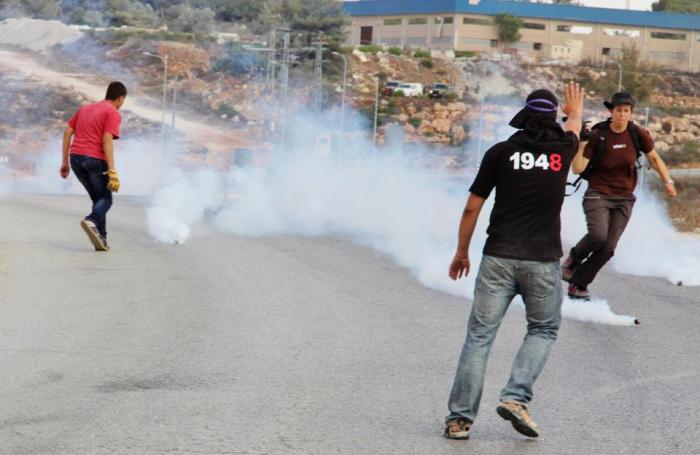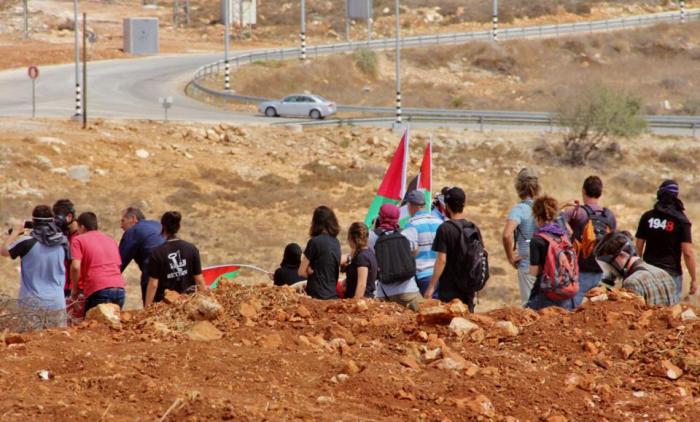AMIRA HASS ON THE ARREST OF NARIMAN TAMIMI AND RANA (NAZZAL) HAMADEH IN NABI SALEH
No less than Israel’s chief military advocate in Judea and Samaria – and dozens of others – were mobilized to keep two women Palestinian demonstrators in custody pending trial.

Relatives of a Palestinian defendant watch proceedings at the Ofer military court in the West Bank. Photo by Daniel Bar-On
Last week, the Israel Defense Forces proved once again how it spares no resources or manpower to defend the Jewish people from any danger lying in wait. This time the glory belongs to the military prosecution, particularly the chief military advocate for Judaea and Samaria, Lt. Col. Morris Hirsch. Eyewitnesses describe how, at the Ofer military court, he mobilized with great enthusiasm to defend us from those trying to harm us.
On Friday June 28, our forces (the IDF and the Border Police) detained two serial threats to Israeli security: Neriman Tamimi, 37, from the village of Nabi Saleh, and Rana Hamadeh, 22, a native of Kabatia who is also a Canadian citizen. Within a week, in four sessions at two military courts, four judges, three prosecutors and several dozen prison guards, translators, drivers, soldiers and typists were recruited to keep the two women in detention until the proceedings ended. That doesn’t include the defense attorney, Neri Ramaty.
The two women were detained in Nabi Saleh, whose inhabitants have been demonstrating for almost three years to get back their spring, which was appropriated by the settlers of Halamish. In the past two years Israeli soldiers killed two demonstrators in the village; one was Rushdi, Tamimi’s brother. He was shot in the back with live fire.
On Friday June 28, several dozen demonstrators gathered in the village and marched to the wadi. Not one stone was thrown at our forces, and still they fired massive amounts of tear gas. The demonstrators scattered in all directions. Tamimi and Hamadeh ran down the mountain, bumped into two other demonstrators and decided to go back up to the village. Then soldiers appeared, said something in Hebrew, waved a piece of paper and detained the two women.
That was at about 2 P.M. They were led on foot to the area of the spring in handcuffs. There they were placed in a jeep where they were blindfolded with flannel cloth. Blindfolded and handcuffed, they spent about eight hours being driven in the jeep and at two military camps.
Only during a short break for an examination by a military doctor were the blindfolds taken off. Tamimi and Hamadeh were brought for interrogation at the Benjamin police station shortly before midnight.
They were left outside, in the cold of the Ramallah hills, until each was summoned to an investigating police officer. They maintained the right to remain silent. Only at 10 A.M. Saturday did they arrive exhausted at the Hasharon women’s prison. About 40 hours later, 2 A.M. Monday, the two were placed on the “bosta,” the bus that takes detainees to the courts.
Legs in chains
They arrived at Ofer about five hours later. The deliberations on extending their detention began at 10:20 A.M – that was already the second session. On Sunday in their absence, the military judge, Maj. Sharon Keinan, acceded to attorney Ramaty’s request and ordered their release on bail. He didn’t understand what was so dangerous that it required keeping the two women in detention, as the police requested, even if they had violated an order concerning a closed military area. The claim that Hamadeh was guilty of verbal violence did not astound him.
Military prosecutors filed an appeal, which was discussed the next day in the presence of Tamimi and Hamadeh. They were brought from the cell to the courtroom with their legs in chains and their hands in plastic handcuffs. In the courtroom only their hands were freed.
The judge of the Military Court of Appeals, Lt. Col. Ronen Atzmon, told the prosecutor, Capt. Gilad Peretz, that it did not appear the two women’s acts were dangerous enough to justify detention until the proceedings ended. Peretz summoned reinforcements: Hirsch, the man in charge of the prosecution.
Hirsch mentioned the regular demonstrations, which, according to the minutes, he said were designed to “defy the district authorities on a day that has become a focus of problematic behavior. There is no anarchy in the district, there is law and a judge, and the moment the respondents trample the law, the moment things reach the stage of recidivism and breaching the law, we think that at this stage, before and indictment is filed, this act constitutes a clear danger …. The respondents are dangerous based both on their past and on the incidents that took place at the site.”
Home, finally
Judge Atzmon ordered their release. “The nuisance and the anger that the respondents cause the security forces do not constitute a reason for detention,” he said. At 10 P.M. the two women were released to their homes.
On Tuesday July 2, they were told to return to the court, where the diligent prosecutors filed the indictment. Both are accused of violating an order regarding a closed military area, and Hamadeh is also accused of interfering with a soldier.
Prosecutor Peretz once again spoke about their past, about the fact that they specifically went down to the dangerous area near the wadi. Attorney Ramaty claimed that the order on the closed military area was unclear and gave examples of Jews who were not detained until the end of proceedings despite previous convictions. In one case, one detainee who was freed had 27 previous convictions of attacking policemen.
The prosecutors were partly successful. The military judge, Maj. Shahar Greenberg, sent the two women to house arrest until the end of the proceedings, but acceded to Ramaty’s request to postpone implementation. The prosecution quickly appealed the postponement, which was discussed on Thursday – by no less than the president of the Military Court of Appeals, Lt. Col. Netanel Benisho. He ordered house arrest for the two women, on Friday July 5.
Does that mean we have to fear for our safety until another judge rules on the prosecution’s demand?























